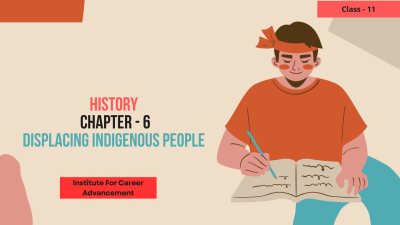Displacing Indigenous People - Class 11

₹299
Displacing Indigenous People is a course that examines the historical and ongoing process of forcibly removing indigenous peoples from their ancestral lands. It explores the complex factors that contribute to displacement, including colonialism, resource extraction, and government policies. Key topics covered in this course include: Colonialism and Indigenous Land Loss: The role of colonialism in displacing indigenous peoples and seizing their lands. Resource Extraction and Indigenous Rights: The conflict between resource extraction industries and indigenous land claims. Government Policies and Indigenous Displacement: The impact of government policies, such as land reform and resettlement programs, on indigenous communities. Indigenous Resistance and Activism: The strategies and tactics used by indigenous peoples to resist displacement and protect their rights. The Consequences of Displacement: The social, economic, and cultural impacts of displacement on indigenous communities. By studying the displacement of indigenous peoples, students gain a better understanding of the historical and ongoing injustices faced by marginalized groups. This course also encourages critical thinking and empathy, as students explore the complex issues surrounding land rights, cultural preservation, and social justice. আদিবাসীদের স্থানচ্যুত করা এমন একটি কোর্স যা আদিবাসীদের তাদের পৈতৃক জমি থেকে জোরপূর্বক অপসারণের ঐতিহাসিক এবং চলমান প্রক্রিয়া পরীক্ষা করে। এটি উপনিবেশবাদ, সম্পদ উত্তোলন এবং সরকারী নীতি সহ স্থানচ্যুতিতে অবদান রাখে এমন জটিল কারণগুলি অন্বেষণ করে। এই কোর্সে অন্তর্ভুক্ত মূল বিষয়গুলির মধ্যে রয়েছেঃ উপনিবেশবাদ এবং আদিবাসী ভূমি ক্ষতিঃ আদিবাসীদের স্থানচ্যুত করা এবং তাদের জমি দখল করার ক্ষেত্রে উপনিবেশবাদের ভূমিকা। সম্পদ উত্তোলন এবং আদিবাসী অধিকারঃ সম্পদ উত্তোলন শিল্প এবং আদিবাসী ভূমি দাবির মধ্যে দ্বন্দ্ব। সরকারী নীতি এবং আদিবাসী স্থানচ্যুতিঃ আদিবাসী সম্প্রদায়ের উপর ভূমি সংস্কার এবং পুনর্বাসন কর্মসূচির মতো সরকারী নীতির প্রভাব। আদিবাসী প্রতিরোধ ও সক্রিয়তাঃ স্থানচ্যুতি প্রতিরোধ এবং তাদের অধিকার রক্ষার জন্য আদিবাসীদের দ্বারা ব্যবহৃত কৌশল ও কৌশল। স্থানচ্যুতির ফলাফলঃ আদিবাসী সম্প্রদায়ের উপর স্থানচ্যুতির সামাজিক, অর্থনৈতিক ও সাংস্কৃতিক প্রভাব। আদিবাসীদের স্থানচ্যুতি অধ্যয়নের মাধ্যমে, শিক্ষার্থীরা প্রান্তিক গোষ্ঠীগুলির সম্মুখীন হওয়া ঐতিহাসিক এবং চলমান অবিচার সম্পর্কে আরও ভাল ধারণা অর্জন করে। এই কোর্সটি সমালোচনামূলক চিন্তাভাবনা এবং সহানুভূতিকেও উৎসাহিত করে, কারণ শিক্ষার্থীরা ভূমি অধিকার, সাংস্কৃতিক সংরক্ষণ এবং সামাজিক ন্যায়বিচার সম্পর্কিত জটিল বিষয়গুলি অন্বেষণ করে।
Learn more
 0
0 